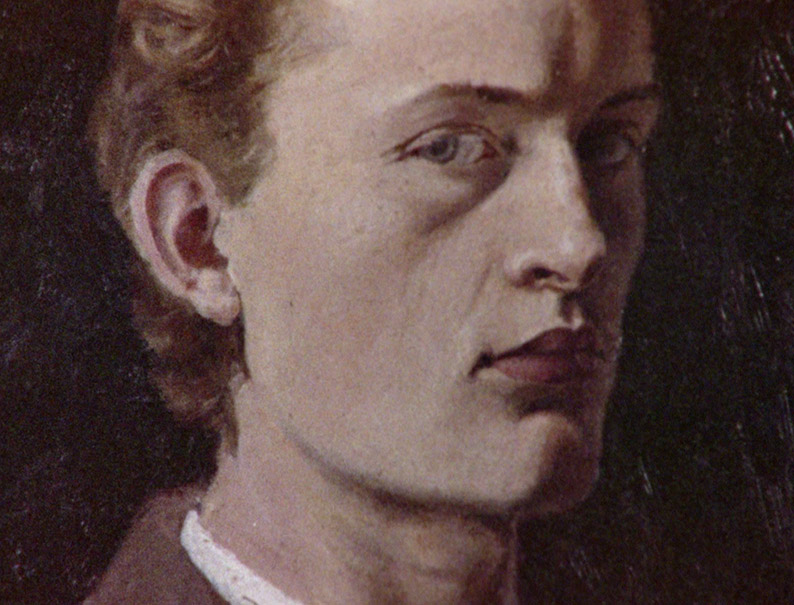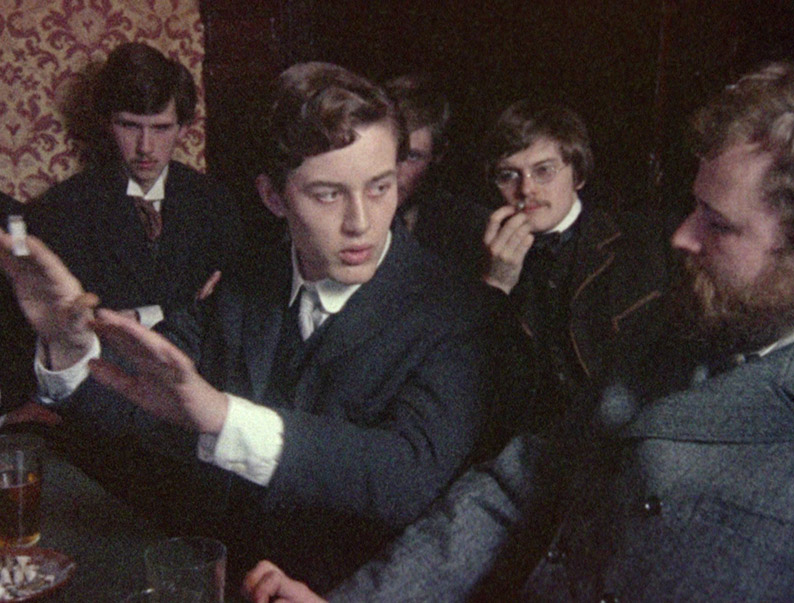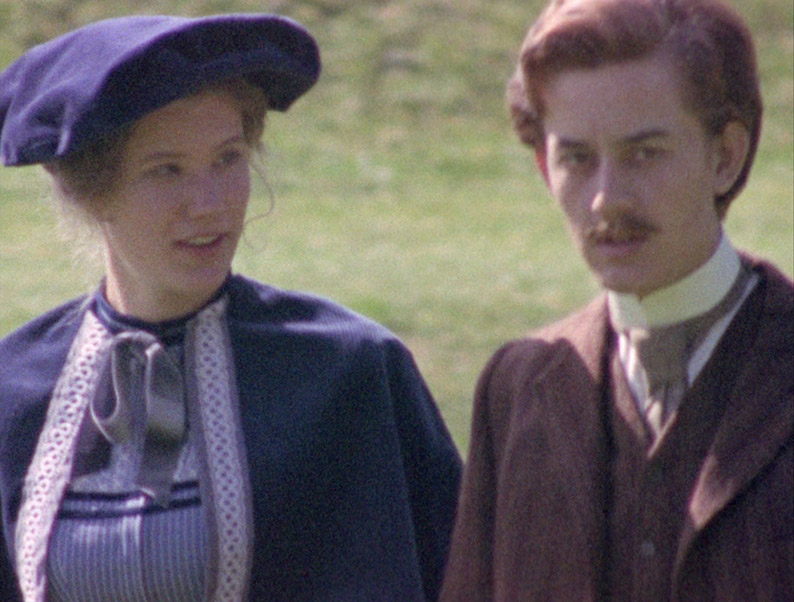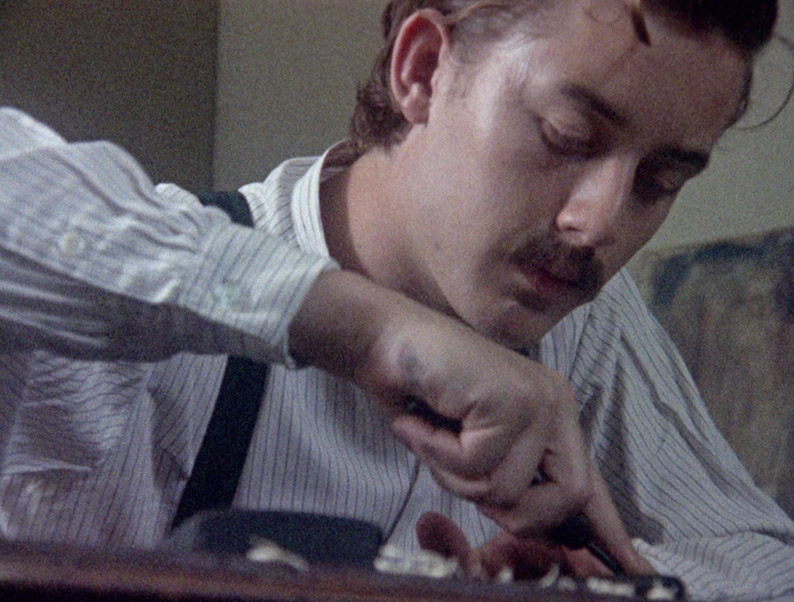Note: The review below has been updated from our coverage of the 2007 Eureka Masters of Cinema DVD release of the film.
Norwegian
painter Edvard Munch is one of those artists that few people who have not taken a specific interest in art history tend to have heard of,
but whose art just about everyone is aware of, or at least one
specific example of it. We're talking, of course, about The Scream, an iconic
work (as it happens, Munch created four variations of the image in paint and pastels under the title The Scream of Nature) in which the anxiety of a screaming woman spills out
into the distorted landscape that surrounds her. It's a
painting that's found its way into the public consciousness
through its absorption into popular culture and continues
to do so – the woman's face became the instantly recognisable Halloween
mask in Wes Craven's 1996 Scream, while
the painting and even its subject have both made memorable appearances in episodes of The Simpsons.
The
fame of this image alone might suggest that its creator
was a successful and wealthy man, but in the all-too familiar manner of artists
who broke new ground in years past, nothing could be further
from the truth. Munch painted and Munch exhibited and the
public and critics all hated what they saw, and I'm not talking
once but every time he tried, over a period of many years
and thousands of paintings, prints and drawings. When most would have given up, Munch just
kept on developing his art in his own non-conformist style,
and yet every time he publicly showed his work it was slated, often
prompting disproportionately extreme reactions – in Berlin an exhibition of his work
was forcibly closed just days after it opened, so outraged
was the establishment by his "anarchistic smears." So what was the horrible crime against
art that Munch's paintings were committing that so offended
the eye of so many beholders? Well, it was quite simple
really – it was new. Munch had chosen to reject established
naturalism in favour of a style that reflected not just
what he saw, but how he reacted to it on an emotional and psychological level.
This approach was later to attract a number of practitioners
and eventually find itself a name: Expressionism.

My
own relationship with Munch's work goes back a fair few
years, and The Scream wasn't the first of his paintings
that I was exposed to. Arriving at his work through art history classes,
my introduction to the artist was his 1894 The
Vampire and the 1899 The Dance of Life, both
of which I adored. He was the first artist – and Expressionism
the first art movement – that I bought books about, and the work
of Munch and the Expressionist artists that followed made immediate
sense to me, both as art and a personal reading of reality.
I was also soon to realise that this approach translated
beautifully to film, something 1920s German cinema in particular
was quick to understand and drawn on.
Long before I first saw it, I was well aware of Peter Watkins' biographical film on
Munch but had never managed to track it down, despite the
considerable praise it has attracted over the years. A cynical part of me couldn't help suspecting that the film's unavailability was stoking the level of this acclaim,
a strain of critical snobbery that thrives on seeing something that others probably never will. That said, I've yet
to see a Peter Watkins film that hasn't left me reeling – Culloden, The War Game
and Punishment
Park are all high up on my list of films that everyone
should see before they die, and the prospect of seeing one of my
favourite painters cinematically profiled by one of my favourite
directors was an enticing one.
Those
familiar with Watkins' cinematic style will immediately
find themselves at home here. This is a drama documentary
with the emphasis on the latter – were it not for the period
in which the extensive re-enactments were set, you could
almost swear Watkins had been there with his camera to record
events as they occurred. Family life and social activities
are patiently observed, with characters intermittently acknowledging
the presence of a camera that will hurriedly reframe or
struggle to focus, while many of them are interviewed by
an unseen but intermittently audible reporter. This air
of reality is enhanced by performances so natural
that it's almost detrimental to classify them as performances
at all, an affect achieved by casting non-professionals
and allowing them to express their own views in their own
way (their resulting modern accents and expressions were
apparently a target for criticism on the film's initial
Norwegian release, which I think is a little picky and somewhat
missing the point).

The
narrative is constructed around readings from Munch's
diary, written sometimes in the third person, and a sober
BBC-style voice-over (by Watkins himself) that provides detailed information
on Munch, his family and his associates, particularly
the café revolutionaries who made up the Boheme,
a well-intentioned but largely ineffective group whose contempt
for established attitudes and religion I nonetheless found
endearing. Relationships embarked on by Munch and
his compatriots receive particular attention, especially
Munch's involvement and post-breakup obsession with the
woman he records in his diary as Mrs. Heiberg, the sort
of self-destructive hopeless cause that always makes me
want to slap some sense into the unfortunate victim. For
Munch it proved fateful, tarring his personal life
with the same level of disappointment and anguish that public
and critical reaction did to his career. If you're looking
for a definition of both tortured artist and driven visionary,
then Edvard Munch is your man.
If
this was the extent of Watkins' reworking of biopic conventions
then it's doubtful the film would have attracted the acclaim
it has, but these are the foundations on which he builds
a far more complex and layered work. Right from the start
he establishes a strong socio-political thread, counterpointing
the superficiality of the middle-class promenade with an
interview with a working-class family, while the narration highlights
the grim conditions and prospects for those at the bottom
of the social ladder. Dates are contextualised through significant
events of the year in question, with a painting by Van Gough or a novel
by H.G. Wells always balanced by news of militaristic
foreboding, such as the birth of Hitler or the invention
of the gatling gun, a direct juxtaposition of the creative
and the destructive.

Just
as Munch rejected naturalism for expressionism, Watkins deliberately
disrupts drama-documentary conventions with a broken mirror
approach to editing, cross-cutting between locations, characters
and timeframes to occasionally disorientating but often hypnotic
and always purposeful effect. Scenes set in the narrative
present are peppered with images of childhood sickness and
Munch's failed relationship with Mrs. Heiberg, twin traumas
that were to haunt the artist's early years and work, while
the underlying linear passage through the most crucial years
of his artistic development can switch in an instant from
the observational to a detailed analysis of how a particular
painting was constructed. The soundtrack is at times similarly
complex, particularly during the cross-cut sequences, two
of which are dominated by the sound of Munch weeping, a
subjective veil of despair that encompasses everyone and
everything even indirectly connected to him.
It's
fascinating, information-packed viewing and it needs to
be – at three-and-a-half hours in length, with only the
voice-over delivered in English and a fair amount of (carefully
selected) image repetition, the film is almost a gift for
rejection by the more intolerant viewer. But if you're serious
about cinema and about art, then Edvard Munch
is an outstanding must-see, a film that really does redefine
the terms by which subsequent and future biographical documentaries
should be judged.
Framed
in its original 1.33:1 aspect ratio – the film originated as a three-part mini-series co-produced by the Norwegian and Swedish state television networks – Edvard Munch was shot on 16mm in sometimes gloomy locations by naturalistic light and is thus not a film whose imagery was designed to pop from the screen. Dark tones and colours dominate both the decor and the costumes, an expressionistic reflection of Munch's uphill struggle for recognition that seems to draw inspiration from the artist's own work. This does intermittently soften the otherwise solid black levels but never in a remotely detrimental way, and when the film does move into exterior daylight the results are very pleasing. The level of picture detail is not 35mm crisp, and while similar to transfer on the 2007 Masters of Cinema DVD release (which looks very much as if it was sourced from the same HD master), the image feels just a few notches sharper and somehow more robust here, something particularly evident on larger screens. Inevitably, the film grain is more visible than on the DVD, but it always feels organic to the material.

Compare the Linear PCM mono 1.0 soundtrack here to the Dolby 2.0 track on the DVD and a couple of differences are immediately apparent. The first is how much difference running the film at its native 24fps (as opposed to the 25fps PAL transfer on the DVD) makes to Watkins narration, slowing it down and lowering the pitch more noticeably than you'd think a single frame speed change would. The sound level is also louder here than on the DVD and has a bolder feel, and there is also almost no trace of the faint background hiss heard on the DVD.
The film can be watched here in its entirity as a 211-minute single film, or in two separate parts of 112 minutes and 111 minutes each (the seemingly longer running time of these combined parts includes opening titles and closing credits on both). It plays with English subtitles on the Norwegian dialogue by default, but can also be played with English SGDH subtitiles or no subtitles at all for those of you fluent in Norwegian.
There
are none on the disc, and given the length of the film and
Watkins' own refusal to give third-party interviews,
that's hardly surprising. This matters not, thanks to the
truly excellent, 80-page Booklet that accompanies
the DVD, which contains a wonderfully detailed essay on
the film by Joseph A. Gomez, a typically revealing self-interview
by Watkins, notes on the restoration by Oliver Groom and
a useful timeline of Munch's life. I'd go as far as to suggest
that the information packed into this booklet actually surpasses
what most commentary tracks could deliver.
When I finally caught up with thjis film after years of increasingly unreasonable expectation-building I was ready for a let-down, but Edvard
Munch lived up to them and delivered a rich palette of surprises along the way. As someone who thought he knew
a lot about this particular artist I found that I still had a great deal to learn, about Munch himself and particularly about the
social and political situation in Norway of the period.
Not an easy entertainment by any means, it's still a hell
of a film, and further proof, if needed, that Peter Watkins
is one of this country's most important and innovative filmmakers,
and yet still one of it's most criminally undervalued.
If you don't already have a copy of the film then this Blu-ray release is the one to go for, and fans of Edvard Munch and/or Peter Watkins should consider this an essential purchase. If you have the previous Masters of Cinema DVD then the decision to upgrade will depend on either your love of the film or the size of your screen – the booklet is essentially the same as the one in the DVD release, but while the audio-visual improvements are not substantial, they do make a difference. Highly recommended.
|